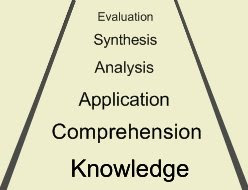

Tony Karrer’s Big Question for July has a syntax that’s almost rhetorical: New Skills and Knowledge for Learning Professionals?
Does he suggest that, perhaps, there is nothing new in that field?
Or is he genuinely asking for innovative ideas on what skills learning professionals should have?
I couldn’t help thinking how taken aback I was at Tony’s reaction to one of my last month’s posts. I’d rattled it off almost like an email reply. When he said he had to walk through it and take notes, he got me thinking about what I’d written. I went back and read it through to check that he was talking about the same post. The first bullet in the closing list on attaining proficiency read:
- identify the required base-knowledge/skills, foster strategies for these to be recognised as key, and provide avenues for their appropriate acquisition and practice
That’s all very simply put in a bullet. It’s the unpacking of what’s bulletised that I think Tony’s after when he asks his Big Question.
In thinking of the complexity of what is embraced in that bullet, a plethora of other lists, schemes and recent and not-so-recent ideas came to mind.
I often take a backward look at Bloom’s Taxonomy, for instance.

New skills?
If the above heirarchy of thinking skills is of any use to the young learner, it must surely be useful in some form to a professional who is still learning. Aren’t we all supposed to be lifelong learners? Isn’t that what our glorious learning journeys are all meant to be about?
Just because the so-called lower-order-thinking-skills are fundamental to the others in the list does not mean that they’re to be neglected once the higher skills are attained. You may as well forget about tyre maintenance and just see to the fine tuning of a car engine before setting off on a long drive. When it comes to traction and treads, there are always new developments in the marketplace. So it is with knowledge in the professional arena.
The fundamentals of learning, understanding and application of knowledge don’t mutate simply because someone has learnt a lot. Why relegate Bloom’s Taxonomy to the classroom? There’s a deal of wisdom there that can be applied to everyday learning in the workplace.
Timely reminders
Often the skilled and knowledgeable person needs to be reminded of some of the strategies that are at their disposal. Knowing what to do, and having the skills to be able to do it, are only part of what a professional needs in order to exercise initiative. The other and most important element is recognising where and when these knowledge and skills can be and should be applied. This takes practice and there’s seldom much time to do this in day-to-day routines.
How people think, and what that thinking is associated with, varies widely from person to person. It’s the context that’s often so important for specific thinking to occur if it's to happen at all. Innovators and naturally creative people rarely need tuition in the elements of how to be innovative or creative. Others new to these skills need relevant and appropriate contexts in order to flex their creativity and innovation.
Whether it is learning to touch-type, finding out how to embed a YouTube video in an announcements page of an LMS, or constructing a new strategy from peer feedback on a project, there needs to be a focus that includes:
- the learner,
- the relevant application of what’s to be learnt,
- the available resources for use by the learner, and
- the time allocated specifically for that up-skilling to happen.
Follow through is essential: that the learner has immediate, relevant and appropriate opportunity to practice what’s been learnt.
Relevant references:
Andrew Churches - Bloom’s (Digital) Taxonomy
http://edorigami.wikispaces.com/file/view/bloom%27s+Digital+taxonomy+v3.01.pdf
UNESCO - Task Force on Education for the Twenty-first Century
http://www.unesco.org/delors/index.html
http://www.unesco.org/delors/fourpil.htm
http://www.unesco.org/delors/delors_e.pdf







No comments:
Post a Comment